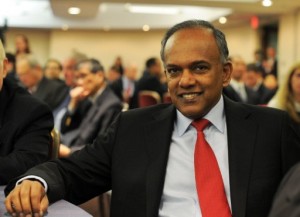
Singaporean Foreign Minister and Minister for Law K. Shanmugam attends "The Singapore Conference" in Washington, DC, on Wednesday, Feb. 8, 2012. Shanmugam is currently visiting Washington to meet US policy makers. AFP PHOTO/JEWEL SAMAD
WASHINGTON, February 8, 2012 – Singapore on Wednesday urged the United States to be careful in comments on China, warning that suggestions of a strategy to contain the rising power could cause strife in Asia.
On a visit to Washington, Foreign Minister K. Shanmugam voiced confidence that the State Department accepted the need for cooperation with China but said that US commentary too often cast Asian politics in “win/lose sporting terms.”
“Domestic pressures in the US and the demands of elections have resulted in some anti-China rhetoric in domestic debates,” Shanmugam told a conference on Singapore at the Center for Strategic and International Studies.
“We in Singapore understand that some of this is inevitable in an election year. But Americans should not underestimate the extent to which such rhetoric can spark reaction which can create a new and unintended reality for the region,” he said.
Singapore is a close partner of Washington and home to a key US military logistical base. But the city-state is highly dependent on trade and has sought smooth commercial relations with Asia’s major economic powers such as China, Japan and India.
“It’s quite untenable – quite absurd – to speak in terms of containment of China. That’s a country with 1.3 billion people,” Shanmugam said.
“It is determined to progress in all fields and take its rightful place in the community of nations. It will succeed in that venture,” he said.
The United States, while looking to trim spending on its giant military to tame a soaring debt, has set a priority on Asia as rapid economic growth and the rise of China look set to reshape the region.
The US military has sought closer cooperation with the Philippines and Vietnam, which have accused China of increasingly bellicose actions to assert control over disputed territories in the South China Sea.
Shanmugan said that the United States should also look at other ways of engagement in Asia such as pressing ahead with the Trans-Pacific Partnership, an emerging trade pact that involves at least nine countries.
It is “a mistake to focus only on the US military presence in the region, to the exclusion of other dimensions of US policy,” he said.


